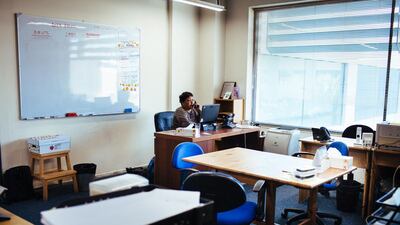DUBAI // Entrepreneurs and small businesses have complained that they are weighed down by regulations that require them to rent unneeded and unwanted office space.
As many businesses move online, using cloud computing, messaging apps and voice services, some said the need for a physical office was becoming redundant, particularly for start-ups and younger companies.
Sajjad Kamal, the 26-year-old founder of Inovio Labs, a technology company, regularly finds himself in Dubai’s cafes and shared working spaces, from where he runs his company and communicates with associates using an app called Slack.
His rarely visited office, for which he paysDh45,000 in rent a year, is about 150 kilometres away.
“I have a physical spot in Al Ain, but I just skimped out on that spot to meet the legal requirement and I barely even go there, it’s just a little hole in the wall,” Mr Kamal said.
While regulations vary by emirate, in Dubai all businesses are required to have an office, said Francesca Bouwman of Watermill Consultants.
In free zones, however, entrepreneurs can opt for a “smartdesk” or “flexidesk”, but the number of visas available for these businesses varied for staffing and is dependent on the size of the office space.
“If one [company] wants to expand its business and if more visas are required, a bigger office space must be rented,” she said.
As the UAE seeks to establish itself as a centre for technological innovation and entrepreneurship, start-up owners like Mr Kamal believe rethinking the regulations could help them grow their businesses and contribute to that vision.
An official with the Dubai Government’s Department of Economic Development said requiring businesses to lease office space helped authorities to ensure they were legitimate.
A physical location allows officials to conduct inspections, such as monitoring operations and ensuring immigration laws are adhered to, he said.
“If you can have these businesses start up with a lower cost, that would be a huge benefit,” said investor Shimi Shah, who also operates a technology and business advisory company, Carousel Solutions. She estimated that the rent for a 500-square-foot office in Dubai Media City would cost an average of Dh75,000 a year.
“We have a number of clients, especially start-ups, that don’t require that space,” she said. “It does eat tremendously into their capital.
“As a start-up, you pretty much need a minimum of US$40-50,000 (Dh147,000 to Dh183,000) to start up a business, which really isn’t the case elsewhere in the world.”
Dubai has some of the higher set-up costs, said Shubhang Bhattacharya, a manager at Impact Hub – a start-up incubator and resource centre.
But if a company can survive the crucial early stages, the UAE offers tax-free profits, he said. “When you start making your money, obviously you will reap more benefits as opposed to being in any other country where there are tax restrictions.”
Mr Bhattacharya said he understood the need for inspections, but that the UAE could explore innovative ways to ensure laws were adhered to. “In a lot of countries, you can register your business to your private address, and therefore you don’t need an office,” he said.
Easing regulations would be a boost to Mita Srinivasan, the director of public relations firm Market Buzz International, which occupies an underused 600-square-foot office in Dubai Media City.
“In the PR and service industry, you don’t need to be tied down to a desk,” she said. “You need to be moving around, you’re meeting clients, customers, and you can very well do it at home or somewhere else where you’re comfortable working.
“The largest expense on my balance sheet is my rent,” she said. “If I had two desks with just half the space, I’d be happy with it.”
And to save money, she lives in Ajman – a round trip of over two hours.
“The governments here are recognising it and becoming more small-business friendly, but for small businesses it’s not happening fast enough,” she said. “You’re putting a huge burden on them and not letting them grow, because you then need to pass on that cost to somebody else.”
esamoglou@thenational.ae

